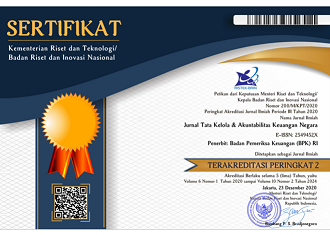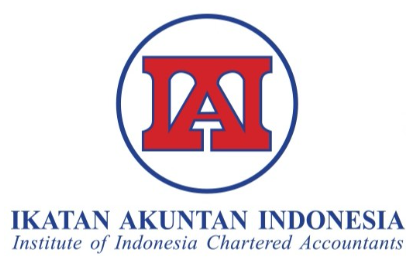The development of knowledge management implementation at the Financial and Development Supervisory Agency (BPKP)
DOI:
https://doi.org/10.28986/jtaken.v9i2.1289Keywords:
Knowledge management, implementation stage, public sector, auditorAbstract
The Financial and Development Supervisory Agency (BPKP), a pivotal public sector entity tasked with internal audit functions, recognizes the paramount importance of effectively managing auditors' experience and expertise. This study aims to delineate the Knowledge Management (KM) implementation stages within BPKP, a topic scarcely explored in Indonesian public-sector research. This study uses an abductive approach with a case study method by explaining a series of events over time with theory-based analysis. The results showed that the KM implementation in BPKP was carried out in four stages: preparation at the local level by conducting change management, work culture development, and initial research; implementation at the local level; implementation at the national level with a focus on the development of process, human, and technology aspects; and national development focuses on laying the groundwork for KM culture. There are KM implementation steps carried out by BPKP but not explained in the theory proposition: change management and developing a work culture that supports KM processes, initial research, benchmarking, and KM implementation regulations. BPKP needs to assess the maturity level of KM to determine the focus areas that need to be improved. This study contributes conceptually to KM frameworks tailored for public sector entities.
References
AAIPI. (2014). Standar Audit Intern Pemerintah Indonesia. https://bsn.go.id/uploads/artikel/saipi2021.pdf
Ali, D. S. (2017). The emerging dimensions of knowledge management. Account and Financial Management Journal, 2(08), 859-863. Retrieved from https://everant.org/index.php/afmjh/article/view/170
Al-Ahbabi, S. A., Singh, S. K., Balasubramanian, S., & Gaur, S. S. (2019). Employee perception of the impact of knowledge management processes on public sector performance. Journal of Knowledge Management, 23(2), 351373. https://doi.org/10.1108/JKM-08-2017-0348
Baporikar, N. (2017). Knowledge management for excellence in the Indian public sector. International Journal of Social Ecology and Sustainable Development, 8(1), 49-63. https://doi.org/10.4018/IJSESD.2017010104
Becerra-Fernandez, I., & Sabherwal, R. (2010). Knowledge management: Systems and processes. M.E. Sharpe, Inc
BPKP. (2010). Peraturan Kepala Badan Pengawasan Keuangan dan Pembangunan Nomor PER-118/K/SU/2010 tentang Grand Design Pengembangan Budaya Kerja Badan Pengawasan Keuangan dan Pembangunan. https://jdih.bpkp.go.id/produkhukum/198/detail
BPKP. (2011). Kajian keterhubungan antara reformasi birokrasi, sistem pengendalian intern pemerintah, dan budaya kerja di lingkungan BPKP (Report Number LHT-1027/LB/2011). Puslitbangwas.
BPKP. (2016). Manajemen perubahan melalui perubahan perilaku pegawai BPKP (Report Number LAP-63/LB/2016). Puslitbangwas.
BPKP. (2019a). Keputusan Kepala Badan Pengawasan Keuangan dan Pembangunan Nomor KEP-205/K/DL/2019 tentang Pengembangan Sistem Pembelajaran Sumber Daya Manusia di Lingkungan Badan Pengawasan Keuangan dan Pembangunan. Sekretariat Utama BPKP.
BPKP. (2019b). Keputusan Kepala Badan Pengawasan Keuangan dan Pembangunan nomor KEP-331/K/LB/2019 tentang Pedoman Pelaksanaan Pengelolaan Pengetahuan dalam Rangka Meningkatkan Inovasi Pengawasan di Lingkungan BPKP. Sekretariat Utama BPKP.
BPKP. (2021a). Peraturan BPKP Nomor 2 Tahun 2021 tentang Peta Proses Bisnis Badan Pengawasan Keuangan dan Pembangunan. https://jdih.bpkp.go.id/pencarian/323/detail
BPKP. (2021b). Peraturan BPKP Nomor 3 Tahun 2021 tentang Pedoman Penyusunan Prosedur Baku Pelaksanaan Kegiatan di Lingkungan Badan Pengawasan Keuangan dan Pembangunan. https://jdih.bpkp.go.id/pencarian/324/detail
BPKP. (2021c). Laporan kinerja instansi pemerintah (LAKIP) Puslitbangwas BPKP tahun 2021 (Report Number LAP-45/LB/2021). https://www.bpkp.go.id/public/upload/unit/puslitbangwas/files/LAP-45%20Laporan%20Kinerja%20Puslitbangwas%202021.pdf
Dalkir, K. (2017). The role of human resources (HR) in tacit knowledge sharing. In Handbook of Research on Tacit Knowledge Management for Organizational Success (pp. 711-725). IGI Global. http://doi.org/10.4018/978-1-7998-0417-8.ch024
Deloitte. (2015). Simplification of work: Knowledge management as a solution. https://www.scribd.com/document/503109188/Deloitte-Knowledge-management-as-a-solution
Fitriadi, A. W. (2016). Analisis tingkat kesiapan implementasi knowledge management (km readiness): Studi kasus Badan Pusat Statistik Republik Indonesia [Tugas Akhir, Universitas Indonesia]. UI Library Repository. https://lontar.ui.ac.id/detail?id=20434317&lokasi=lokal
Godbout, A. J. (2000). Managing core competencies: The impact of knowledge management on human resources practices in leading-edge organizations. Knowledge and Process Management, 7(2), 76-86. http://doi.org/10.1002/10991441(200004/06)7:23.0.CO;2-B
Government Regulation Number 60 of 2008 concerning Government Internal Control System (Peraturan Pemerintah RI Nomor 60 Tahun 2008 tentang Sistem Pengendalian Intern Pemerintah). https://www.bpkp.go.id/public/upload/unit/sakd/files/PP60Tahun2008_SPIP.pdf
Hariyanto, G. (2018). Analisis tingkat kesiapan penerapan manajemen pengetahuan: Studi kasus badan pengembangan sumber daya manusia provinsi DKI Jakarta [Tugas Akhir, Universitas Indonesia]. UI Library Repository. https://lib.ui.ac.id/m/detail.jsp?id=20480453&lokasi=lokal
Joshi, H., Farooquie, J. A., & Chawla, D. (2016). Use of knowledge management for competitive advantage: The case study of max life insurance. Global Business Review, 17(2). https://doi.org/10.1177/0972150915619830
Leidner, D., Alavi, M., & Kayworth, T. (2006). The role of culture in knowledge management: A case study of two global firms. International Journal of e-Collaboration, 2(1), 17-40. http://doi.org/10.4018/jec.2006010102
Ma’ayan, Y., & Carmeli, A. (2015). Internal audits as a source of ethical behavior, efficiency, and effectiveness in work units. Journal Business Ethics, 137(2), 347–363. http://doi.org/10.1007/s10551-015-2561-0
Mai, D. N., & Nguyen, H. T. L. (2022, September 1-2). A knowledge management model for internal auditing [Paper presentation]. The 23rd European Conference on Knowledge Management, Italy. https://doi.org/10.34190/eckm.23.2.523
Mitrovic, Z., Obradovic, V., & Suknovic, M. (2018). Knowledge management in the public sector: The case of Serbian local government. Serbian Journal of Management, 13(2), 293-309. https://doi.org/10.5937/sjm13-15037
Mukhlasin, H., & Budi, I. (2017). Analisis pengukuran tingkat kesiapan penerapan manajemen pengetahuan: Studi kasus Badan Pendidikan dan Pelatihan Keuangan Kementerian Keuangan. Jurnal Sistem Informasi, 13(1), 11-20. https://doi.org/10.21609/jsi.v13i1.514
Muluk, M. R. K. (2008). Knowledge management: Kunci sukses inovasi pemerintahan daerah. Banyumedia Publishing.
Nonaka, I., & Takeuchi, H. (1995). The knowledge-creating company. Oxford University Press.
Nonaka, I., Toyama, R., & Nagata, A. (2000). A firm as a knowledge-creating entity: A new perspective on the theory of the firm. Industrial and Corporate Change, 9(1), 1-20. https://doi.org/10.1093/icc/9.1.1
Pradana, S. I., Kurniawati, A., & Ambarsari, N. (2015). Knowledge management system implementation readiness measurement in PDII LIPI based on people and organizational structure factors. Procedia Manufacturing, 4, 216-223. https://doi.org/10.1016/j.promfg.2015.11.034
Presidential Regulation Number 81 of 2010 concerning Grand Design for Bureaucratic Reform 2010 – 2025 (Peraturan Presiden RI Nomor 81 Tahun 2010 tentang Grand Design Reformasi Birokrasi 2010 – 2025). https://jdihn.go.id/files/4/2010pr081.pdf
Presidential Instruction Number 9 of 2014 concerning Improving the Quality of the Internal Control System and the Reliability of Implementing the Internal Control Function in the Context of Realizing Community Welfare (Instruksi Presiden RI Nomor 9 Tahun 2014 tentang Peningkatan Kualitas Sistem Pengendalian Intern dan Keandalan Penyelenggaraan Fungsi Pengawasan Intern dalam Rangka Mewujudkan Kesejahteraan Masyarakat. https://jdih.bpkp.go.id/produkhukum/2070/detail
Presidential Regulation Number 192 of 2014 concerning Financial and Development Supervisory Agency (Peraturan Presiden RI Nomor 192 Tahun 2014 tentang Badan Pengawasan Keuangan dan Pembangunan). https://www.bpkp.go.id/public/upload/unit/perekonomian/files/Perpres%20Nomor%20192%20Tahun%202014%281%29.pdf
Quink, U. (2008). An exploration of knowledge management and intellectual capital in a nonprofit organization context [Master thesis, Queensland University of Technology]. QUT Library Repository. https://eprints.qut.edu.au/28598/
Rahmasari, M. (2015). Analisis knowledge management solutions: Studi kasus Badan Pemeriksa Keuangan Republik Indonesia (BPK RI) [Tugas Akhir, Universitas Indonesia]. UI Library Repository. https://lib.ui.ac.id/m/detail.jsp?id=20405178&lokasi=lokal
Regulation of the Minister of State Apparatus Utilization and Bureaucratic Reform Number 14 of 2011 concerning guidelines for implementing knowledge management programs (Peraturan Menteri Negara Pendayagunaan Aparatur Negara dan Reformasi Birokrasi nomor 14 tahun 2011 tentang pedoman pelaksanaan program manajemen pengetahuan (knowledge management)). https://peraturan.bpk.go.id/Details/132862/permen-pan-rb-no-14-tahun-2011
Riley, T. B. (2005). Knowledge management: An essential tool for the public sector. In T. Menkhoff, H. D. Evers, Y. W. Chay (Eds.), Governing and Managing in Asia. https://doi.org/10.1142/9789812569424_0007
Setiarso, B. (2007). Penerapan knowledge management pada organisasi: Studi kasus salah satu unit organisasi LIPI. Retrieved from http://ilmukomputer.org/wp-content/uploads/2007/04/bse-ksni.pdf
Tiwana, A. (2002). The knowledge management toolkit (2nd Edition). Prentice Hall.
Yin, R. K. (2018). Case study research and applications: Design and method, sixth edition. SAGE Publications, Inc.
Downloads
Submitted
Accepted
Published
How to Cite
Issue
Section
License
Copyright (c) 2023 Jurnal Tata Kelola dan Akuntabilitas Keuangan Negara

This work is licensed under a Creative Commons Attribution-ShareAlike 4.0 International License.

Jurnal Tata Kelola dan Akuntabilitas Keuangan Negara is licensed under
a Creative Commons Attribution-ShareAlike 4.0 International License




















